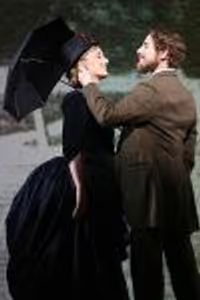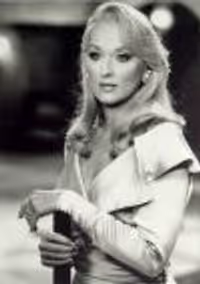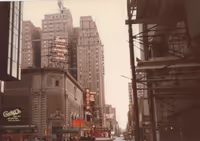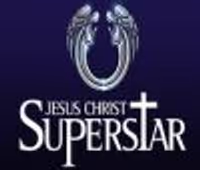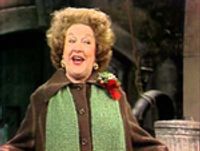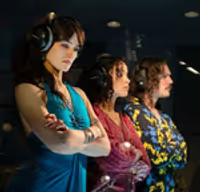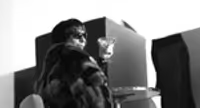Radcliffe, Groff, and Mendez star in MERRILY - Reviews & News Thread
#50Confirmed: Radcliffe to lead MERRILY revival at NYTW
Posted: 3/8/22 at 9:42am
ColorTheHours048 said: "And with the same shows over and over. I’m not a fan of incessant Shakespeare either, no matter how brilliant the material, but at least Shakespeare has a deep canon to pull from. Sondheim has fewer shows to produce, and therefore, we see a lot of the same few shows repeatedly."
I would challenge you on this assessment, but I guess at the end of the day it just depends on what metrics you're using, and your own personal threshold for repetition.
I'm very much used to seeing multiple productions of the same Shakespeare play within the same season, and many times over the course of multiple seasons. While there are individual plays I get tired of, I generally have no problem seeing a play multiple times with different actors and re-interpretation. For me, the idea of 2 Merrily productions within the span of 3-4 years is nothing. Especially when I'm so excited for the latter one.
Also, it's funny you mention Shakespeare's deep bench, because while yes, Shakespeare wrote twice as many pieces as Sondheim, I'd argue we see comparatively less variety, over even shorter cycles.
In the last 10-12 years, we've had high-profile NYC revivals and/or concert productions of almost all of Sondheim's major works, with only 2 or 3 exceptions. And within that time, we've had only a handful of multiples. Perhaps most notably with Into the Woods, Assassins, Sweeney Todd, and now Merrily - and each of those have had maybe 2-3 major mountings in the last decade, including concerts.
To me, that's nothing compared to the deluge of Hamlets, Lears, Midsummers, Twelfth Nights, Macbeths, Romeo and Juliets, etc. I'd argue that in NYC, we see a disproportionate representation of Shakespeare's most popular plays compared to Sondheim's most popular shows, even adjusted for the relative "depth of the bench" for each artist. And likewise, I'd argue that it's harder to find a high-profile NYC production of Shakespeare's most obscure plays than Sondheim's most obscure musicals.
In other words, I think we're actually making better use of Sondheim's bench than Shakespeare's bench, but personally I don't mind seeing repeats of either.
#51Confirmed: Radcliffe to lead MERRILY revival at NYTW
Posted: 3/8/22 at 12:07pm
TaffyDavenport said: “The original NYT article says “late this year.”"
Thank you! I somehow missed that.
#52Confirmed: Radcliffe to lead MERRILY revival at NYTW
Posted: 3/8/22 at 2:39pm
I mean I'd take Passion and Sunday in the Park in every season with different actors/actresses/productions.
But it does seem a little over saturated.
#53Confirmed: Radcliffe to lead MERRILY revival at NYTW
Posted: 3/8/22 at 4:56pm
SouthernCakes said: "So I watched the YouTube of this production and… is it just that maybe this show doesn’t work? What were the reactions to the original play? Like, I get the idea is fun for a rewind. But that first scene is so heavy and it def feels like something that would happen after an 11 o’clock number so it’s interesting to open with it. I’m def on the fence about the show as a whole. Maybe the whole reverse thing just doesn’t work thematically?"
The original production was savaged after an infamously long in-town previews period, and has been reconfigured a number of times (in my opinion it keeps getting less experimental and somehow more apologetic). The initial concept had a bookend where Frank has a meltdown while giving a speech to the graduating class of his old high school, and all of the students are like "what on earth happened to this guy", and then the rest of the show is them putting on a high school production of his life. That's a pretty tough concept to sell, particularly on top of an already convoluted idea, but while removing that makes it tidier, it also kinda reduces it to a subpar one-joke melodrama with no conclusion.
There's also the fact that Frank is a pretty dull protagonist. He cheats on his wives, sells out, and annoys his friends, but there's not much else there, which is probably why Charley gets all the interesting actors (though this issue goes back to the play it's based on, too). And then there's lot of fudging on the basic "how did you get to be here" question - almost all of Frank's bad choices are because of Gussie, as opposed to some intrinsic personality flaw, which dampens the dramatic potential.
Sondheim notably once said that he, Furth, and Prince were all trying to create three different shows, suggesting that that's why it didn't work. I'm not sure if it can ever truly overcome that without serious workshopping.
#54Confirmed: Radcliffe to lead MERRILY revival at NYTW
Posted: 3/8/22 at 5:57pmInteresting original concept with the high school. I saw the recent Encores and it was my first time seeing the show. I just think the dramatic tension is weird because it starts at a 10 and then goes to a 1. Like we are throw into this super dramatic scene with a drunk friend, but we aren't really invested yet. Also the score to me just feels so 70s. And I don't mean that in any negative way.
#55Confirmed: Radcliffe to lead MERRILY revival at NYTW
Posted: 3/8/22 at 6:40pm
If I've said it once, I've said it a million times. Hurt pride, ridiculous fealty to a play that was also a flop in its day, and a stubborn attempt to "fix Allegro" have been the only things getting in the way of the obvious solution: make like Mom and Dad always threatened to do and turn the car around.
It starts at a 10 and goes to 1? Okay. Flip it back to front.
These people are thoroughly unsympathetic or don't seem to be in control of their fate, and by the time we arrive at the beginning/end, it's hard to care about their innocence? Noted. Start at the end instead.
Herman Mankiewicz once said of the source: "It's a problem play about this playwright who writes a play and it's a big success, and then he writes another play and that one is a big success, all his plays are big successes, and all the actresses in them are in love with him, all these beautiful women are in love with him, and he has a yacht and a beautiful home in the country and a penthouse in town, and a beautiful wife and two beautiful children, and he makes a million dollars. Now the problem the play propounds is this: how did the poor son of a bitch ever get into that situation?" Now, as The Great Gatsby shows, it is possible to make this a sympathetic story, to care about somebody who has gained the whole world and lost their soul. But however that can be accomplished, you don't do it by playing the story in goddamn reverse. Sorry, not sorry.
I'd play the whole show in chronological order, starting from "Opening Doors." If I kept the transitions, they'd play out in reverse order, with the opening "Merrily We Roll Along" being sort of a conglomerate of the song itself and the "Seventh Transition." All is otherwise the same, but plays in chronological order, until the ending. And there's one of two ways that can go:
1) Restore the graduation scene with "The Hills of Tomorrow." Frank is doing this bit for his alma mater before he runs off to that night's party where "That Frank" will occur, and it's the young valedictorian that reminds him of himself that he finds so striking. (Maybe the realization that he wrote exactly one song in his whole career stings a bit, too.) When the party turns out as it inevitably does, we close on Frank alone in his apartment, as he reflects on when he was young and full of hope; the show closes, as always, with "Our Time."
2) The party scene comes first, then he has to do the alma mater, then "Our Time." It even allows for a broken Aesop: the lesson isn't "never dream because it only leads to ruin," it's "be realistic, but don't lose that hope." Sondheim gets to have his depressing cake (because that's not the lesson Frank learned) and eat it too.
But... they'll never do it.
Broadway Legend
joined: 5/1/05
Blocked: After Eight, suestorm, david_fick, emlodik, lovebwy, Dave28282, joevitus, BorisTomashevsky, Seb28
#56Confirmed: Radcliffe to lead MERRILY revival at NYTW
Posted: 3/9/22 at 11:52am
Not the boldest choice for NYTW. Especially when they have so few slots on their season. They'll certainly sell a lot of tickets though, so I can understand the move. Still - another Sondheim revival starring a movie star? When you could've programmed an exciting new play by an exciting new voice? Disappointing.
UrNotAMachine
Stand-by Joined: 2/17/15
#58Confirmed: Radcliffe to lead MERRILY revival at NYTW
Posted: 3/9/22 at 5:46pm
g.d.e.l.g.i. said: "If I've said it once, I've said it a million times. Hurt pride, ridiculous fealty to a play that was also a flop in its day, and a stubborn attempt to "fixAllegro"have been the only things getting in the way of the obvious solution: make like Mom and Dad always threatened to do and turn the car around.
It starts at a 10 and goes to 1? Okay. Flip it back to front.
I've seen this idea batted around before and Sondheim even sent a few cease and desists to theatres attempting to reverse the shows' chronology. But I think the "just reverse it" mentality doesn't really make sense for this show in practice.
To me, the show's biggest issue is even more apparent when you put the whole thing back in order-- and that's the fact that no real dramatic tension exists within the piece. It's all a very run-of-the-mill story about an idealistic person slowly sacrificing their ideals until they become a cynical shell of their former self. The fact that the story is told in reverse is actually one of the few things the show that is actually generating any suspense or tension at all. Take that away and you're really left with nothing of interest.
Telling the story in order would just make it a massive downer, and one of the most successful parts of the show as it stands now is the dissonance of ending on such a hopeful note while knowing it's all going to go horribly wrong. Without the backward chronology, most of the poignancy is destroyed.
#59Confirmed: Radcliffe to lead MERRILY revival at NYTW
Posted: 3/9/22 at 6:41pm
True as that may be, it's not like that problem doesn't exist with the show in its conventional order. There's no dramatic justification for why we're experiencing the show backwards and why we're seeing specific events happen at specific points; it often seems to move at random, with no real story justification for why we move from scene to scene and a lot of "this happens and then this happens" plotting.
(Having said that, for all the love the original 1981 book gets in this thread, it was especially awful at trying to justify why certain events happened when; a good example is the script at one point essentially having Charlie go "after that terrible TV interview he'll never forgive me!" aaaaaand cue the next scene being the terrible interview. I can only imagine that was the result of frantic revisions based on audience reaction in previews.)
I feel like that graduation scene is the key, which is why it's a shame it was cut in revision. Older Frank has a line regarding the valedictorian (played by Younger Frank) where he says something to the effect of "You remind me a lot of myself." In my opinion, this is the central point of the show, and what they were trying (and failing, alas) to do originally. On a metatextual level, Old Frank is taking this valedictorian backward through his own life to show exactly how he got to this point -- and, most importantly, why Younger Frank shouldn't make the same mistake.
The show is fundamentally about youth, and specifically about the current generation not making the same mistakes as the older. But instead of emphasizing that element when they set about revising the show, they stripped the youth out of it entirely. They got caught up in the puzzle because that's what they were most concerned about (shades of Sondheim struggling with strictly defining exactly when people were meant to figure out the Beggar Woman's true identity in Sweeney). And so we're stuck with the current version, which, even if it's still flawed after so doing, would work better (IMO) chronologically than backward when answering the question of how Mr. Shepard got "here" from "there."
Broadway Legend
joined: 5/1/05
Blocked: After Eight, suestorm, david_fick, emlodik, lovebwy, Dave28282, joevitus, BorisTomashevsky, Seb28
Consistency
Understudy Joined: 7/2/13
#60Confirmed: Radcliffe to lead MERRILY revival at NYTW
Posted: 3/9/22 at 7:16pm
Not really getting the "oversaturation" comments - I've actually been disappointed by the dearth of major Sondheim productions since I moved to the East Coast in 2015. IF this makes it to Broadway, it'll only be the third Sondheim show on Broadway in the past ten years. (It's also the first NYC revival, on- or off-Broadway, announced since his death.)
I'm hoping we'll see some more in the next few years... maybe even a full-scale "Sweeney Todd"? Please?
In an ideal world, there'd be a revival of one of his shows every season.
#61Confirmed: Radcliffe to lead MERRILY revival at NYTW
Posted: 3/9/22 at 7:36pm
ColorTheHours048 said: "Douglas Lyons said it better than I could."
I agree with his sentiment, and even his logic to an extent. But like, again I feel like the whole premise of “the show is being revived twice in 4 years” is kind of a false one. This production has been trying to come to NYC for over a decade, and there’s demand for it. And perhaps more importantly, it’s extremely different from the Fiasco production, which was really not good. If there’s demand for a piece to be reinterpreted by new actors and directors, I don’t think that should be used as a reason to paint it as pointless rehashes or retreads. This isn’t Broadway where the “revival” clock gets reset every 10-20 years.
Having said that, I think there’s a real case for saying this shouldn’t have gone to a non-profit. Getting slots in a non-profit MainStage season is very competitive. It’s valuable for many reasons, but partly because it comes with a built-in audience for exposure and credibility.
If the “enhancement” producers on this show wanted to start off-Broadway, they could’ve rented out the Daryl Roth and still made an absolute killing. They didn’t need the non-profit infrastructure when it would’ve been more beneficial to an early-career writer or color, and I guess that’s really the underlying concept behind Lyons’ post.
But again this whole business about lumping this in with the Fiasco production just feels like a non-argument to me.
#62Confirmed: Radcliffe to lead MERRILY revival at NYTW
Posted: 3/9/22 at 7:50pm
I don't really care when the last revival was. I didn't see it. I'd venture to guess most of the people coming to see Daniel Radcliffe didn't see it either.
JSquared2
Broadway Legend Joined: 3/23/17
#63Confirmed: Radcliffe to lead MERRILY revival at NYTW
Posted: 3/9/22 at 8:29pm
ColorTheHours048 said: "Douglas Lyons said it better than I could."
Maybe if Douglas Lyons had written a better play, he wouldn't be so bitter?
Larry6417
Understudy Joined: 11/20/13
#64Confirmed: Radcliffe to lead MERRILY revival at NYTW
Posted: 3/9/22 at 10:10pm
jacobsnchz14 said: "NYTimes
New York Theater Workshop, best known as the birthplace of “Rent,” said Monday that its production of “Merrily” would run in “late 2022”; it did not announce dates. Radcliffe will play Charley Kringas, a lyricist and playwright; the theater did not announce other cast members."
We certainly do not need another production of this, but thank the theatre gods that Harry P is NOT playing Frank!
#65Confirmed: Radcliffe to lead MERRILY revival at NYTW
Posted: 3/9/22 at 11:46pm
Consistency said: "I'm hoping we'll see some more in the next few years... maybe even a full-scale "Sweeney Todd"? Please?"
Well, you're about to be very pleased by some news coming down the pike, though not necessarily the casting...
Broadway Legend
joined: 5/1/05
Blocked: After Eight, suestorm, david_fick, emlodik, lovebwy, Dave28282, joevitus, BorisTomashevsky, Seb28
#66Confirmed: Radcliffe to lead MERRILY revival at NYTW
Posted: 3/9/22 at 11:55pm
g.d.e.l.g.i. said: "Consistency said: "I'm hoping we'll see some more in the next few years... maybe even a full-scale "Sweeney Todd"? Please?"
Well, you're about to be very pleased by some news coming down the pike, though not necessarily the casting..."
Say what??
RainyAgwe
Chorus Member Joined: 7/28/18
#67Confirmed: Radcliffe to lead MERRILY revival at NYTW
Posted: 3/9/22 at 11:55pm
Someone I know who works there says there will be a couple of other pretty exciting choices for this one, so hopefully they aren’t wrong 😂
#68Confirmed: Radcliffe to lead MERRILY revival at NYTW
Posted: 3/10/22 at 1:46am
What makes this show so "reviv-able?" I like Sondheim, but I don't find the score to particularly interesting. And the story just doesn't work. So why do we keep getting this instead of, say, Road Show, which, I think is a really great musical that hasn't had a great production.
JasonC3
Broadway Legend Joined: 4/22/21
#69Confirmed: Radcliffe to lead MERRILY revival at NYTW
Posted: 3/10/22 at 2:11am
Larry 6417 says:
"We certainly do not need another production of this, but thank the theatre gods that Harry P is NOT playing Frank!"
Who is this we of whom you speak?
As this thread already shows, some of us are just fine with this production being mounted and look forward to seeing it.
Nothing wrong with you saying you don't, but perhaps claim your own take.
chrishuyen
Broadway Legend Joined: 11/12/14
#70Confirmed: Radcliffe to lead MERRILY revival at NYTW
Posted: 3/10/22 at 2:40am
As someone who prefers listening to the OBC of Merrily, I agree that the bookended graduation scenes are kind of required to make the show fully click, since you see Frank at the beginning giving his commencement speech after having lost all idealism, and by the end of the show you see how he was once the same kind of kid with big dreams that he talks down to in the first scene. The book certainly has major flaws, but I think the direction and production itself probably hampered the original show more than the book did. I'd love to see a version where they add in that last graduation scene (maybe do just a verse of Our Time on the roof as a pre-prise?) and still end with Our Time.
fwiw, I'm also a fan of Rich and Happy over That Frank, but I suppose it changes how tragic Frank's adult life is depending on which one is used. I wish they'd kept Rich and Happy in the overture though.
As to what makes the show so reviv-able, I think it's because it seems like there should be a version that works (I mean, I basically just gave my own pitch), but no one's hit on a universal version yet (but from what it sounds like, this version comes close). I do also find the score both quite poignant (in Our Time, Not a Day Goes By, Growing Up) and surprisingly wry (Now You Know, The Blob, even Opening Doors). And I quite enjoy the structure of the pre-prises and repetition of motifs (it always amuses me how Frank basically only has one good melody and keeps repurposing it). It's almost like Into the Woods in the sense that I'm always excited to see what they're planning on doing with it because each production seems to try to tweak at least a couple things.
Pashacar
Broadway Star Joined: 11/2/18
#71Confirmed: Radcliffe to lead MERRILY revival at NYTW
Posted: 3/10/22 at 9:57am
JBroadway said: "Having said that, I think there’s a real case for saying this shouldn’t have gone to a non-profit. Getting slots in a non-profit MainStage season is very competitive. It’s valuable for many reasons, but partly because it comes with a built-in audience for exposure and credibility.
If the “enhancement” producers on this show wanted to start off-Broadway, they could’ve rented out the Daryl Roth and still made an absolute killing. They didn’t need the non-profit infrastructure when it would’ve been more beneficial to an early-career writer or color, and I guess that’s really the underlying concept behind Lyons’ post."
I agree big time here, and have to say it kind of sours my perceptions of NYTW that they took this on, especially at the end of James Nicola's tenure. Their mission statement says they aim to:
Develop and produce the work of visionary theatre artists who:
- Engage with challenging ideas and push the theatrical form;
- Prioritize art that asks questions over art that provides answers;
- Expand our view of ourselves and our world.
In what way will this production do any of that? It won't – it will just make money.
#72Confirmed: Radcliffe to lead MERRILY revival at NYTW
Posted: 3/10/22 at 10:12am
ljay889 said: "g.d.e.l.g.i. said: "Consistency said: "I'm hoping we'll see some more in the next few years... maybe even a full-scale "Sweeney Todd"? Please?"
Well, you're about to be very pleased by some news coming down the pike, though not necessarily the casting..."
Say what??"
Saying anymore without confirmation would be against BWW's rules, so just keep watchin' the news, that's all I can tell you. Without naming names and thereby breaching a ton of things, I'll simply say that I think the director makes sense on paper, albeit I won't be all that excited personally by what he does with it, but the casting of the two leads is the laziest crap since they invented the self-turning ice cream cone. (Like, compared to this, Sutton Foster as Marian Paroo is perfection.)
Broadway Legend
joined: 5/1/05
Blocked: After Eight, suestorm, david_fick, emlodik, lovebwy, Dave28282, joevitus, BorisTomashevsky, Seb28
52889j
Featured Actor Joined: 12/8/15
#73Confirmed: Radcliffe to lead MERRILY revival at NYTW
Posted: 3/10/22 at 10:41am
Ethel Berman said: "Not the boldest choice for NYTW. Especially when they have so few slots on their season. They'll certainly sell a lot of tickets though, so I can understand the move. Still - another Sondheim revival starring a movie star? When you could've programmed an exciting new play by an exciting new voice? Disappointing."
While this take is certainly not incorrect, I can't help but wonder if those who feel this way have paid attention to the rest of NYTW's programming. Their 2021-2022 season only had four slots. Merrily is bumping the 22/23 season from four to five. Since reopening in fall 2021, they've produced works by Whitney White, Martyna Majok, Kristina Wong, and Aleshea Harris - all exciting new plays by exciting, relatively new voices, I would say.
They don't have to produce a movie star revival once in two years, but neither does Roundabout.
#74Confirmed: Radcliffe to lead MERRILY revival at NYTW
Posted: 3/10/22 at 1:22pm
Producing stuff like this - and making money in the process - allows them to do the more outrage, interesting stuff.
That said, watching the show on YouTube, hopefully they do something different as I thought that the production as a whole was just not exciting.
Videos


